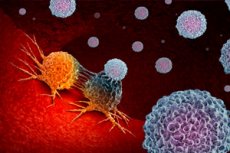New publications
RNA Immunotherapy: A Universal Tool Against Cancer and Autoimmune Diseases
Last reviewed: 09.08.2025

All iLive content is medically reviewed or fact checked to ensure as much factual accuracy as possible.
We have strict sourcing guidelines and only link to reputable media sites, academic research institutions and, whenever possible, medically peer reviewed studies. Note that the numbers in parentheses ([1], [2], etc.) are clickable links to these studies.
If you feel that any of our content is inaccurate, out-of-date, or otherwise questionable, please select it and press Ctrl + Enter.

Scientists M. Savguira and colleagues from several leading centers summarized in a review for Trends in Molecular Medicine advances in RNA immunotherapy, an approach that combines the flexibility of mRNA technologies and the power of immune modulation to combat cancer and autoimmune disorders.
What is RNA immunotherapy?
They are based on linear mRNA molecules encoding either tumor antigens or autoantigens themselves, or immunomodulatory factors (cytokines, checkpoint inhibitors). Unlike DNA vectors, mRNA does not integrate into the genome, is quickly translated and then degraded, which increases safety.
Key areas of application
MRNA-based cancer vaccines
Personalized platforms incorporating patient-specific tumor neoantigens have already shown high efficacy in early clinical trials for melanoma and lung cancer.
MRNA-encoded cytokines and chimeric receptors (CAR-mRNA T cells)
Translation of IL-12 or IL-2 directly into the tumor microenvironment enhances the local immune response without systemic toxicity.
CAR-T cells, programmed with mRNA, can be “rewired” for different purposes without long-term genetic modification.
Therapy for autoimmunity and inflammation
MRNA vaccines encoding tolerant versions of autoantigens can return the immune system to a state of self-tolerance in type 1 diabetes and multiple sclerosis.
Technical achievements
- Optimized nucleosides (pseudouridine, acetyl-5-methylcytidine) increase mRNA stability and reduce the early inflammatory response upon administration.
- Lipid nanoparticles (LNPs) with a novel composition and charge profile enable targeted delivery of mRNA to dendritic cells or target tissues.
- Multi-component mRNA cocktails: a combination of antigens, adjuvants and immunomodulators allows fine-tuning of the type and strength of the response.
Benefits and Challenges
- Versatility and scalability: the platform can be easily adapted to any new targets and scale up production.
- Safety: Lack of integration into the genome and rapid catabolism of mRNA reduce the risks of long-term mutagenicity.
- Challenges:
- Further optimization of delivery to “cold” tumors with low immune infiltration;
- Management of local and systemic inflammation to minimize side effects;
- Selection of optimal neo-antigens and dosages for autoimmune conditions.
“RNA immunotherapy combines the best of both worlds: the precision of genetic coding and the power of immune modulation. It is a truly universal platform for the future of medicine,” concludes M. Savguira.
Prospects
- Phase III clinical trials of personalized mRNA vaccines for melanoma and lung cancer to begin in 2026
- The emergence of “universal” LNP platforms capable of delivering various RNA formulations using a single production recipe.
- Expanding autoimmune indications: upcoming studies will test the efficacy of the mRNA model of tolerance in rheumatoid arthritis and inflammatory bowel disease.
The authors emphasize four key points:
The flexibility and adaptability of the platform
“the mRNA approach allows for the rapid restructuring of therapy for new oncogenes or autoantigens, which is critical for personalized medicine,” notes M. Savguira.Balancing efficacy and safety
“Optimized nucleosides and modern LNP delivery provide a powerful immune response without prolonged expression of foreign proteins and the risk of integration into the genome,” adds co-author Prof. K. Shen.Synergy with existing methods
“RNA vaccines and CAR-mRNA T cells can be combined with checkpoint inhibitors or chemotherapy for maximum effect,” emphasizes Dr. A. Robinson.Need for further research
“We need to understand how to optimally dose and temporally regulate local mRNA expression to avoid excessive inflammation and autoimmune reactions,” concludes Dr. L. Gonzalez.
RNA immunotherapy opens a new era of precision treatment that can adapt to any pathology of the immune system - from aggressive cancer to complex autoimmune disorders.
